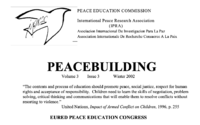Technology used for Peace in Cyprus: Difference between revisions
No edit summary |
(Created Category:Publications with SDDs) |
||
| (One intermediate revision by the same user not shown) | |||
| Line 1: | Line 1: | ||
{{Journal Publication | {{Journal Publication | ||
|acronym= | |acronym=Technology used for Peace in Cyprus | ||
|logo= | |logo=Peacebuilding_Paper2002.png | ||
|authors=[[Yiannis Laouris]] & [George Tziapouras] | |authors=[[Yiannis Laouris]] & [[George Tziapouras]] | ||
|journal= Peacebuilding | |journal= Peacebuilding | ||
|volume=3(3) | |volume=3(3) | ||
| Line 20: | Line 20: | ||
[[Category:Journal Publication]] | [[Category:Journal Publication]] | ||
[[Category:Publications with SDDs]] | |||
Latest revision as of 04:39, 20 November 2023
|
Abstract
The island of Cyprus is a case in point, where, while the historical roots of the conflict are complicated, the result is quite simple; Cyprus has been partitioned into segregated Greek and Turkish communities, separated by a buffer zone that is patrolled by the United Nations Force in Cyprus (UNFICYP). While the United Nations force has greatly minimised the incidents of intercommunal violence, the continuing division of the island has consistently obstructed, except for a short period of time, physical contact between the two communities, and by extension any consistent and lasting peace-building and confidence building measures between the two communities.
Citation
Laouris, Y., & Tziapouras, G. (2002). Technology used for peace in Cyprus. Peacebuilding, 3(3), 4-8.
